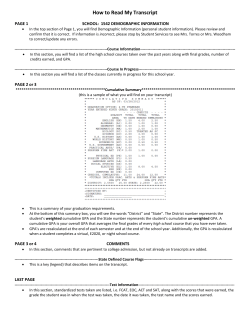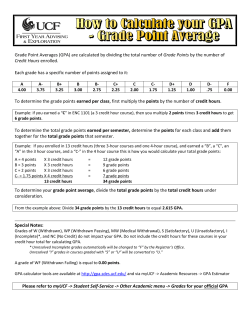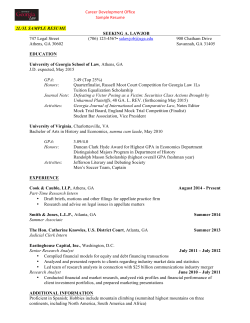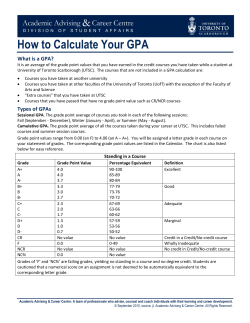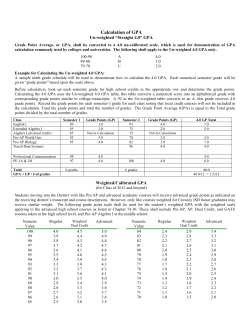
How to Calculate your Grade Point Average (GPA)
How to Calculate your Grade Point Average (GPA) Multiply the number of credit hours for the course by the point value of the letter grade earned in the course. The product of this multiplication will be the total grade points for the course. See example below: course credit hours times ENGL 111 4 credits x point value A grade (value is 4.0) equals total grade points = 16 The total credit hours calculated into the GPA is called total GPA hours. Within the NMSU system, total GPA hours consist of the total credits in which grades of A+ through F have been earned. To determine the GPA, divide the total GPA hours into the total grade points. A semester GPA is a GPA calculation of courses taken in one particular semester. The cumulative GPA is simply an overall GPA of all courses taken. In the following example, 17 total GPA hours divided into 36.7 total grade points equals a GPA of 2.158. course ENGL 111 CCDM 114N C S 110 THTR 101 COLL 101 Totals credit hours 4 4 3 3 3 17 total GPA Hours times x x x x x point value A (4.0) B- (2.7) C+ (2.3) D+ (1.0) F (0) equals = = = = = total grade points 16.0 10.8 6.9 3.0 0 36.7 total grade points 2.158 GPA NMSU Grade Point Values Letter Grade A+ A AB+ B BC+ C CD+ D DF Excellent Excellent Excellent Better than Average Better than Average Grade Point Value 4.0 4.0 3.7 3.3 3.0 Letter Grade W N CR/CD IP Better than Average Average Average Average Below Average Below Average Below Average Failing 2.7 2.3 2.0 2.0 1.0 1.0 1.0 0 PR S* U I AU Description RR Description Withdrawal Grade Not Submitted Credit Authorized In Progress Progress in Undergraduate Course Progress on Graduate Thesis Satisfactory Unsatisfactory Incomplete Audit Grade Point Value Not Computed Not Computed Not Computed Not Computed Not Computed Not Computed Not Computed Not Computed Not Computed Not Computed *An S grade is a grade satisfactory to the professor and is normally equivalent to the grade of C or higher. A student’s NMSU semester and cumulative GPAs are based solely on courses taken at NMSU or under an approved National Student Exchange. A course for which only CR, but no letter grade, is given and a course in which an S or PR grade is earned may be counted toward graduation but is not computed in the GPA. Information on Grading from the NMSU Undergraduate Catalog Repeating Courses A student may repeat a course in which a D or F grade has been earned at this university. A computable grade (excluding I, W, RR, AU, CR, S, or U) in a repeated course may be substituted in the calculation of the grade-point average, though the original grade also remains on the transcript. The first occurrence with a C or better grade will count in earned/passed hours. Future attempts will not count in earned/passed hours. If a student repeats a course eligible for grade substitution in which they have earned a D and then fails the course, the second grade of F will not be substituted for the original grade. Neither credits nor grade points may be earned by repeating a course for which a grade of C or higher has already been received. Repeat option applies only to eligible courses that were completed prior to the time a student was awarded a baccalaureate degree at NMSU. Incomplete Grade The grade of I (incomplete) is given for passable work that could not be completed due to circumstances beyond the student’s control. Instructors may assign I grades only if the student is unable to complete the course due to circumstances beyond the student’s control that develop after the last day to withdraw from the course. Examples of appropriate circumstances include documented illness, documented death or crisis in the student’s immediate family, and similar circumstances. Job related circumstances are generally not appropriate grounds for assigning an I grade. In no case is an I grade to be used to avoid the assigning of D, F, U, or RR grades for marginal or failing work. A student has 12 months to complete remaining coursework as specified by the instructor in a manner satisfactory to the instructor before an I grade may be removed and replaced by a letter grade. See your academic advisor and refer to the current NMSU undergraduate catalog for further details. RR Grade The RR grade applies only to designated skill development undergraduate courses approved by the University Curriculum Committee and indicates the student has made substantial progress toward completing the requirements of the course. It carries neither penalty nor credit. The student must re-enroll and successfully complete the course in order to earn credit. The grade of RR may be received only once in any given course, and it remains on the student’s transcript. S/U Option Students with 28 credits at NMSU under traditional grading, with an overall average of 2.5 or better, may exercise the S/U option. The following limitations apply: 1) No more than 7 credits per semester or 4 credits per summer session 2) Not to exceed a total of 21 semester credits. These limitations do not apply to honors and courses officially designated S/U. Each course under this option must be requested during registration. Eligibility must be determined by the student’s academic dean and certified by the student. The course must be taken outside the major. Eligibility for S/U grading must be re-established after adjusted credit has been approved. Non-degree students who do not meet the above requirements may take courses under the S/U option. However, these courses may not be applied toward an undergraduate degree at NMSU. See your academic advisor and refer to the current NMSU undergraduate catalog for further details. Audits A regularly enrolled student may register for any course prior to the last day of registration as an auditor without credit with the consent of instructor, provided the facilities are not required for regular students. The fee is the same as for credit courses. Audit courses are not considered in determining the maximum load except for students on probation and graduate students. A student may not change from credit to audit after the last day to register but may withdraw and continue to attend with the permission of the instructor. Revised 5/28/13
© Copyright 2025
